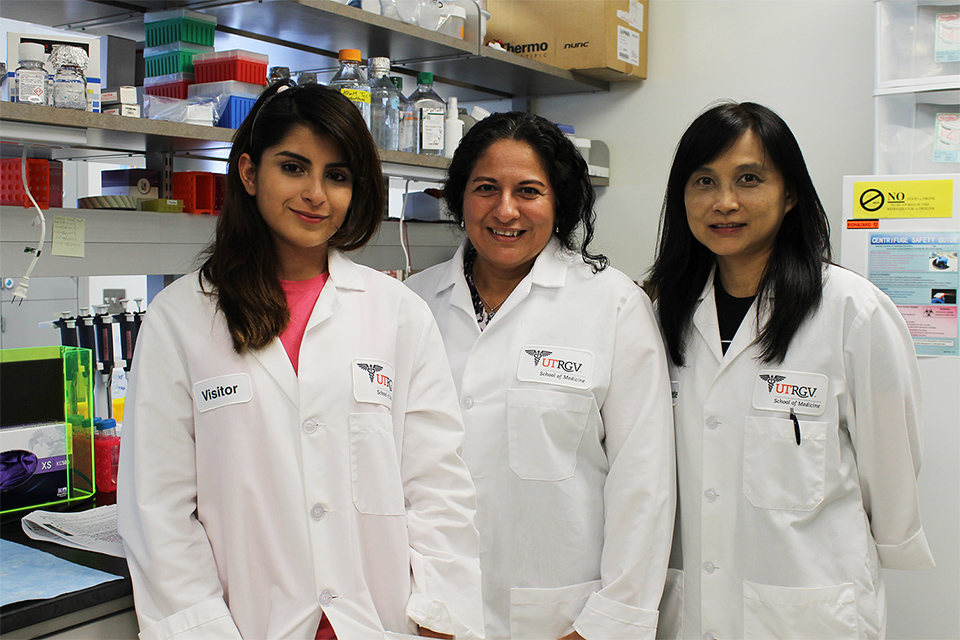By Jennifer Berghom
Rio Grande Valley, Texas – Dr. Sara M. Reyna, assistant professor in the Department of Biomedical Sciences at The University of Texas Rio Grande Valley School of Medicine, has received a three-year, $435,900 grant from the National Institutes of Health (NIH) to research the role of the protein, extracellular signal regulated-kinase (ERK), in macrophages (white blood cells) in relation to inflammation in skeletal muscle.
Reyna, whose research project is entitled “Macrophage ERK Signaling and its Application in Modulating Skeletal Muscle Insulin Resistance,” will receive $145,300 each year from the NIH’s National Institute of General Medical Sciences, to study if removing ERK in macrophages will reduce inflammation in skeletal muscle to protect against developing insulin resistance.
Saturated fatty acids are elevated in obesity, which is a risk factor for type 2 diabetes. High levels of fatty acids can increase inflammation, which then act on skeletal muscle to induce insulin resistance. Insulin resistance occurs when tissues, such as the skeletal muscle, do not respond to insulin to remove glucose from the bloodstream. This can lead to high blood glucose levels, also known as hyperglycemia. Eventually, this can result in type 2 diabetes, Reyna said.
Reyna and her team want to evaluate whether removing the ERK protein in macrophages can block macrophage activation and reduce inflammation. They are specifically looking at skeletal muscle, because skeletal muscle takes in about 80-90 percent of the glucose produced after eating a meal, she said.
Reyna’s team includes research associates Phoebe Fang-Mei Chang and Daniel Acevedo, and undergraduate student Sarai Ramirez, a junior majoring in biology. She said she and her team have done some preliminary research showing that when they treat macrophage cells in culture with saturated fatty acids, but remove the ERK protein, inflammation is decreased.
“Insulin resistance, which occurs before type 2 diabetes, is believed to be caused by chronic inflammation,” she said. “It occurs at the molecular and cellular level before, clinically, it can be seen as type 2 diabetes. Now, we want to determine if what we found in cell culture is also true in a mouse model of type 2 diabetes.”
The research could result in potential new therapeutic targets for the prevention and treatment of insulin resistance and type 2 diabetes.
Dr. John H. Krouse, UTRGV executive vice president for Health Affairs and dean of the School of Medicine, said Reyna’s research will contribute greatly to the development of new treatments for diabetes and related diseases.
“The School of Medicine is committed to engaging in research that will create and translate biomedical knowledge and will lead to innovations in treatment of diseases that affect residents of the Rio Grande Valley,” he said. “Dr. Reyna’s work has the potential to improve the health of many who suffer from type 2 diabetes, a disease that affects nearly one in three people in the Rio Grande Valley.”
The grant lasts through March 31, 2021.
ABOUT UTRGV
The University of Texas Rio Grande Valley (UTRGV) was created by the Texas Legislature in 2013 as the first major public university of the 21st century in Texas. This transformative initiative provided the opportunity to expand educational opportunities in the Rio Grande Valley, including a new School of Medicine and a School of Podiatry, and made it possible for residents of the region to benefit from the Permanent University Fund – a public endowment contributing support to the University of Texas System and other institutions.
UTRGV has campuses and off-campus research and teaching sites throughout the Rio Grande Valley including Brownsville (formerly The University of Texas at Brownsville campus), Edinburg (formerly The University of Texas-Pan American campus), Harlingen, Weslaco, McAllen, Port Isabel, Rio Grande City and South Padre Island. UTRGV, a comprehensive academic institution, enrolled its first class in the fall of 2015; the School of Medicine welcomed its first class in the summer of 2016, and the School of Podiatric Medicine in the fall of 2022.

